小学英语语法时态讲解与归纳
人教版小学英语语法--时态总结(一般现在时-一般过去式-现在进行时-一般将来时)
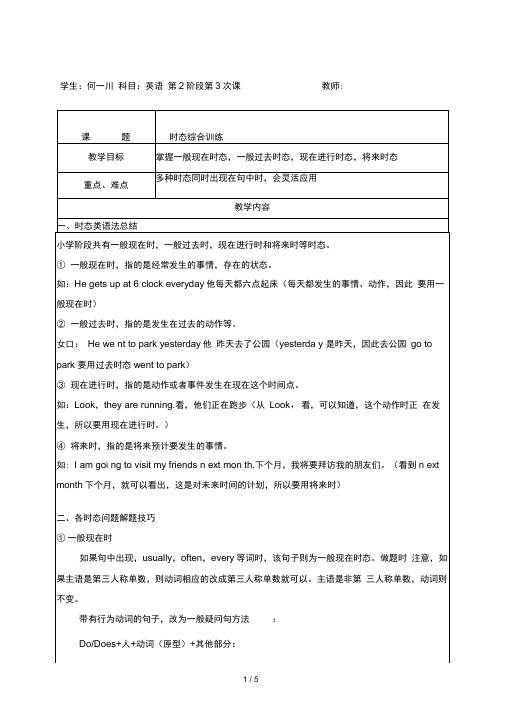
学生:何一川科目:英语第2阶段第3次课教师:学生:何一川科目:英语第2阶段第3次课教师:带有Be动词的句子,改为一般疑问句的方法:Be+人+其他:He is a good student.-----s he a good student?(第三人称单数用does开头,非第三人称单数用do开头,一二人称互换,l--You,We-You)例题:I usually go to school by bike. --------- Do you usually go to school by bike? (该句人称要互换)He ofte n watches TV on Sundays- ------ D oes he ofte n watch TV on Sun days?They often play football after dinner. ----------- Do they often play football after dinn er?②一般过去时女口果句中出现,last week/last weekend/last month/last year yesterday the day before yesterday X days ago (其中,last是“上一” d的意思,ago是“…前”的意思)等词时,该句子则为一般过去时态。
做题时,只要把动词,改成过去时态。
关键是记忆总结不规贝U动词的过去式。
如:go---went,do---did,swim--swam例题:I visited my grandmother last weekend.They bought a new bike10 days ago.He was ill yesterday.改为一般疑冋句:Did +人+动词(原型)+其他?③现在进行时如果句中出现,look,listen,now等词(看,XX正在做某事;听,XX正在做某事;现在,XX正在做某事)。
(完整)小学英语语法时态一般过去时详解
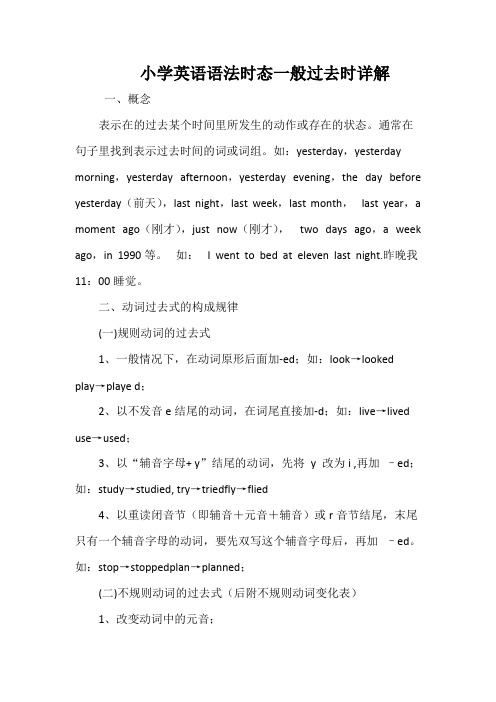
小学英语语法时态一般过去时详解一、概念表示在的过去某个时间里所发生的动作或存在的状态。
通常在句子里找到表示过去时间的词或词组。
如:yesterday,yesterday morning,yesterday afternoon,yesterday evening,the day before yesterday(前天),last night,last week,last month,last year,a moment ago(刚才),just now(刚才),two days ago,a week ago,in 1990等。
如:I went to bed at eleven last night.昨晚我11:00睡觉。
二、动词过去式的构成规律(一)规则动词的过去式1、一般情况下,在动词原形后面加-ed;如:look→looked play→playe d;2、以不发音e结尾的动词,在词尾直接加-d;如:live→lived use→used;3、以“辅音字母+ y”结尾的动词,先将y 改为i ,再加–ed;如:study→studied, try→triedfly→flied4、以重读闭音节(即辅音+元音+辅音)或r音节结尾,末尾只有一个辅音字母的动词,要先双写这个辅音字母后,再加–ed。
如:stop→stoppedplan→planned;(二)不规则动词的过去式(后附不规则动词变化表)1、改变动词中的元音;begin→began drink→drank come→came eat→ate grow→grew run→ran know→knew win→wonspeak→spoketake→took write→wrote get→got2、变词尾的–d 为–t ;build→built lend→lent send→sent spend→spent bend→bent3、与动词原形一样;cut→cut put→put cost→cost hurt→hurt shut→shut4、变-ay 为-aid (少数动词);say→said pay→paid lay→laid5、采用不同词根;sell→sold teach→taught buy→bought6、其他。
(完整版)小学英语语法_四大时态

四大时态复习1. 一般现在时(1)一般现在时的构成(肯定句)☆be动词:主语+be(am,is,are)+其它。
如:I am a boy.我是一个男孩。
☆行为动词:主语+行为动词(+其它)。
如:We study English.我们学习英语。
☆当主语为第三人称单数(he, she,it)时,要在动词后加"-s"或"-es"。
如:Mary likes Chinese. 玛丽喜欢汉语。
(2)一般现在时的变化☆. be动词的变化。
[否定句]:主语+ be + not +其它。
如:He is not a worker.他不是工人。
[一般疑问句]:Be +主语+其它。
如:-Are you a student? -Yes. I am. / No, I'm not.[特殊疑问句]:疑问词+一般疑问句。
如:Where is my bike?☆.行为动词的变化。
[否定句]:主语+ don't( doesn't ) +动词原形(+其它)。
如:I don't like bread.当主语为第三人称单数时,要用doesn't构成否定句。
如:He doesn't often play.[一般疑问句]:Do( Does ) +主语+动词原形+其它。
如:- Do you often play football?- Yes, I do. / No, I don't.当主语为第三人称单数时,要用does构成一般疑问句。
如:- Does she go to work by bike? - Yes, she does. / No, she doesn't.[特殊疑问句]:疑问词+一般疑问句。
如:How does your father go to work?*动词+s的变化规则1.一般情况下,直接加-s,如:cook-cooks, milk-milks2.以s. x. sh. ch. o结尾,加-es,如:guess-guesses, wash-washes, watch-watches, go-goes 3.以“辅音字母+y”结尾,变y为i, 再加-es,如:study-studies2.现在进行时(1)一般现在时的构成:be(am,is, are)+ 动词的ing形式。
译林版小学英语语法知识
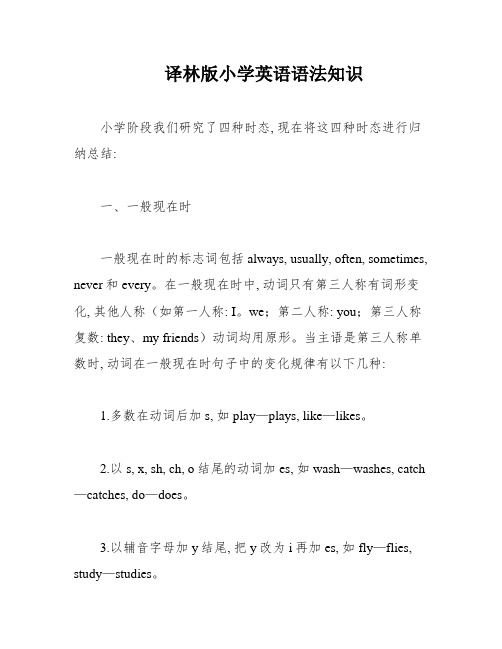
译林版小学英语语法知识小学阶段我们研究了四种时态, 现在将这四种时态进行归纳总结:一、一般现在时一般现在时的标志词包括always, usually, often, sometimes, never和every。
在一般现在时中, 动词只有第三人称有词形变化, 其他人称(如第一人称: I。
we;第二人称: you;第三人称复数: they、my friends)动词均用原形。
当主语是第三人称单数时, 动词在一般现在时句子中的变化规律有以下几种:1.多数在动词后加s, 如play—plays, like—likes。
2.以s, x, sh, ch, o结尾的动词加es, 如wash—washes, catch —catches, do—does。
3.以辅音字母加y结尾, 把y改为i再加es, 如fly—flies, study—studies。
4.以元音字母加y结尾, 直接加s, 如buy—buys。
5.不规则变化, 如have—has。
一般现在时的基本用法有以下几种:1.表示事物或人物的特征、状态, 如The sky is blue.(天空是蓝色的)。
2.表示经常性或惯性的动作, 如I get up at six every day.(我每天六点起床)。
3.表示客观现实, 如XXX around the sun.(地球绕着太阳转)。
一般现在时的构成有以下两种:1.be动词: 主语+be(am。
is。
are)+其它, 如I am a boy.(我是一个男孩)。
2.行为动词: 主语+行为动词(+其它), 如XXX.(我们研究英语)。
一般现在时的句型包括肯定句、否定句和一般疑问句:1.肯定句:A。
be动词: 主语+be+其它成分, 如He is a worker.(他是一名工人)。
B。
行为动词: 主语+动词(注意人称变化)+其它成分, 如We like the little cat.(我们喜欢这只小猫)。
小学英语语法六种时态
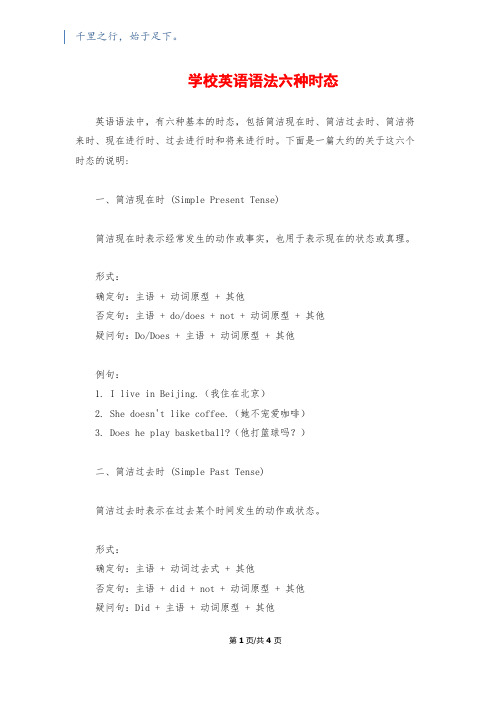
学校英语语法六种时态英语语法中,有六种基本的时态,包括简洁现在时、简洁过去时、简洁将来时、现在进行时、过去进行时和将来进行时。
下面是一篇大约的关于这六个时态的说明:一、简洁现在时 (Simple Present Tense)简洁现在时表示经常发生的动作或事实,也用于表示现在的状态或真理。
形式:确定句:主语 + 动词原型 + 其他否定句:主语 + do/does + not + 动词原型 + 其他疑问句:Do/Does + 主语 + 动词原型 + 其他例句:1. I live in Beijing.(我住在北京)2. She doesn't like coffee.(她不宠爱咖啡)3. Does he play basketball?(他打篮球吗?)二、简洁过去时 (Simple Past Tense)简洁过去时表示在过去某个时间发生的动作或状态。
形式:确定句:主语 + 动词过去式 + 其他否定句:主语 + did + not + 动词原型 + 其他疑问句:Did + 主语 + 动词原型 + 其他第1页/共4页例句:1. We watched a movie yesterday.(我们昨天看电影了)2. He didn't go to the party.(他没去参与派对)3. Did you finish your homework?(你完成作业了吗?)三、简洁将来时 (Simple Future Tense)简洁将来时表示将要发生的动作或状态。
形式:确定句:主语 + will + 动词原型 + 其他否定句:主语 + will + not + 动词原型 + 其他疑问句:Will + 主语 + 动词原型 + 其他例句:1. I will call you tomorrow.(我明天会给你打电话)2. She won't be late for the meeting.(她不会迟到参与会议)3. Will they come to the party?(他们会来参与派对吗?)四、现在进行时 (Present Continuous Tense)现在进行时表示正在进行的动作或状态。
(完整版)小学英语语法时态讲解与归纳(参考)
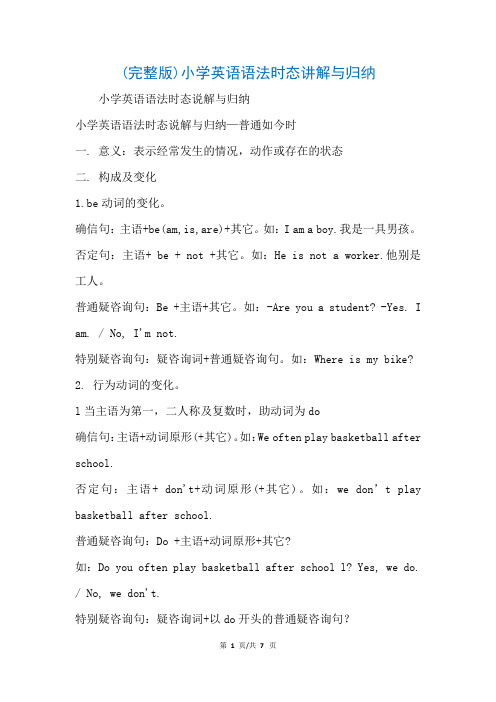
(完整版)小学英语语法时态讲解与归纳小学英语语法时态说解与归纳小学英语语法时态说解与归纳—普通如今时一. 意义:表示经常发生的情况,动作或存在的状态二. 构成及变化1.be动词的变化。
确信句:主语+be(am,is,are)+其它。
如:I am a boy.我是一具男孩。
否定句:主语+ be + not +其它。
如:He is not a worker.他别是工人。
普通疑咨询句:Be +主语+其它。
如:-Are you a student? -Yes. I am. / No, I'm not.特别疑咨询句:疑咨询词+普通疑咨询句。
如:Where is my bike?2. 行为动词的变化。
l当主语为第一,二人称及复数时,助动词为do确信句:主语+动词原形(+其它)。
如:We often play basketball after school.否定句:主语+ don't+动词原形(+其它)。
如:we don’t play basketball after school.普通疑咨询句:Do +主语+动词原形+其它?如:Do you often play basketball after school l? Yes, we do. / No, we don't.特别疑咨询句:疑咨询词+以do开头的普通疑咨询句?如:What do you often do after school ?l当主语为第三人称单数时,助动词为does确信句:主语+动词三单式(+其它)。
如:He swims well.否定句:主语+ doesn’t+动词原形(+其它)。
如:He doesn’t swim well..普通疑咨询句:Does +主语+动词原形+其它。
如:Does he swim well ?Yes, he does. / No, he doesn't.特别疑咨询句:疑咨询词+以does开头的普通疑咨询句?如:How does your father go to work?三.第三人称单数的动词变化规则(惟独在第三人称为主语的确信句中,动词才用三单式)(1)多数动词直截了当加s:Runs gets likes collets takes plays climbs…….(2)结尾是s, x, sh, ch, o,前为辅音字母,结尾加es :Watches teaches goes does washes crosses mixes brushes (3)动词末尾y前为辅音:将y改为i加es: study→studies fly→fliescarry→carries cry→cries但在y前假如为元音则直截了当加s: buys says四.时刻标志:always , usually , often , sometime s ,every…如今举行时一.意义——当表示如今正在举行的动作或正在发生的事。
小学英语语法-一般现在时详细讲解

小学英语语法-一般现在时详细讲解一般现在时是英语语法中最基础也是最常用的时态之一。
它表示的是习惯性、经常性和普遍性的行为或状态。
在本文中,我将详细介绍一般现在时的形式、用法和注意事项。
一、一般现在时的形式一般现在时的肯定句的基本结构是:主语+谓语动词+其他。
谓语动词在第三人称单数形式时要加上-s或-es。
例如:- I eat breakfast every morning.(我每天早上吃早饭。
)- She goes to school by bus.(她坐公共汽车去学校。
)否定句的结构是:主语+do not/does not+动词原形+其他。
例如:- I do not like coffee.(我不喜欢咖啡。
)- He does not play football.(他不踢足球。
)疑问句的结构是:Do/Does+主语+动词原形+其他?例如:- Do you like ice cream?(你喜欢冰淇淋吗?)- Does she go to the park every weekend?(她每个周末去公园吗?)二、一般现在时的用法第1页/共4页1. 表示习惯或经常性的动作:- I write in my diary every night.(我每天晚上写日记。
)- They play basketball every Sunday.(他们每个星期天打篮球。
)2. 表示客观事实、自然规律或科学真理:- Water boils at 100 degrees Celsius.(水在100摄氏度时煮沸。
)- The sun rises in the east.(太阳从东方升起。
)3. 表示感觉、想法和喜好:- I love chocolate.(我喜欢巧克力。
)- He hates to wake up early.(他讨厌早起。
)4. 表示现时状态或现时临时的动作:- I am a student.(我是一个学生。
一般现在时第三人称单数、疑问句
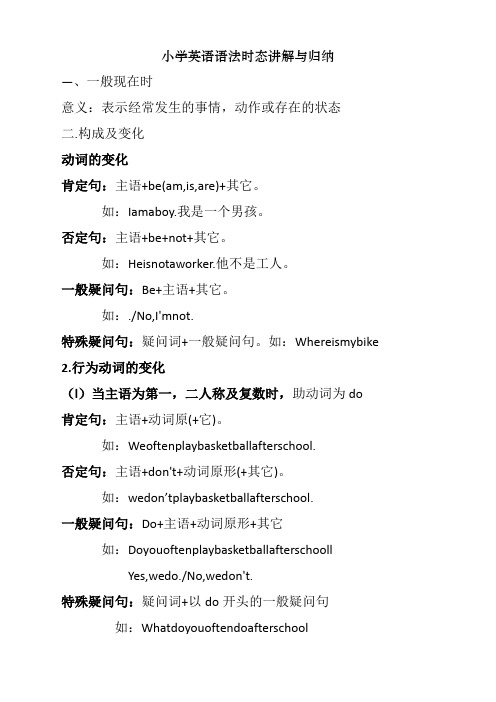
小学英语语法时态讲解与归纳—、一般现在时意义:表示经常发生的事情,动作或存在的状态二.构成及变化动词的变化肯定句:主语+be(am,is,are)+其它。
如:Iamaboy.我是一个男孩。
否定句:主语+be+not+其它。
如:Heisnotaworker.他不是工人。
一般疑问句:Be+主语+其它。
如:./No,I'mnot.特殊疑问句:疑问词+一般疑问句。
如:Whereismybike 2.行为动词的变化(l)当主语为第一,二人称及复数时,助动词为do肯定句:主语+动词原(+它)。
如:Weoftenplaybasketballafterschool.否定句:主语+don't+动词原形(+其它)。
如:wedon’tplaybasketballafterschool.一般疑问句:Do+主语+动词原形+其它如:DoyouoftenplaybasketballafterschoollYes,wedo./No,wedon't.特殊疑问句:疑问词+以do开头的一般疑问句如:Whatdoyouoftendoafterschool(2)当主语为第三人称单数时,助动词为does肯定句:主语+动词三单式(+其它)。
如:Heswimswell.否定句:主语+doesn’t+动词原形(+其它)。
如:Hedoesn’tswim well.一般疑问句:Does+主语+动词原形+其它。
如:DoesheswimwellYes,hedoes./No,hedoesn't.特殊疑问句:疑问词+以does开头的一般疑问句如:Howdoesyourfathergotowork三.第三人称单数的动词变化规则(只有在第三人称为主语的肯定句中,动词才用三单式)(1)多数动词直接加s:runs getslikescolletstakesplays climbs…….(2)结尾是s,x,sh,ch,o,前为辅音字母,结尾加es:watches teaches goes does washes crossesmixes brushes(3)动词末尾y前为辅音:将y改为i加es:study→studiesfly→fliescarry→carriescry→cries但在y前如果为元音则直接加s:buyssays四.时间标志:always,usually,often,so metimes,every…一般现在时练习Heoften (have)dinnerathome. DanielandTommy (be)inClassOne.We (notwatch)TVonMonday.Nick (notgo)tothezooonSunday.they (like)theWorldCupWhattheyoften (do)onSaturdaysyourparents(read)newspaperseverydayThegirl (teach)usEnglishonSundays.SheandI(take)awalktogethereveryevening.There(be)somewaterinthebottle.Mike____(like)cooking.They____ (have)thesamehobby.Myaunt____(look)afterherbabycarefully. Youalways______(do)yourhomeworkwell.I (be)’mstayinginbed.She (go)toschoolfromMondaytoFriday.LiuTao_____(do)notlikePE.Thechildoften_____(watch)TVintheevening. SuHaiandSuYang____(have)eightlessonsthisterm.-Whatday___(be)ittoday-It’sSaturdayWinter, spring, summer and autumn (be)seasons.Danny (take) off his T-shirt now.Today (teach) a science lesson.Jenny and I (live) in Canada.Jenny (want) to go to school in chinaLet me (help) youShe eats a sandwich(总是)Li Ming goes to school by bicycle(有时)。
- 1、下载文档前请自行甄别文档内容的完整性,平台不提供额外的编辑、内容补充、找答案等附加服务。
- 2、"仅部分预览"的文档,不可在线预览部分如存在完整性等问题,可反馈申请退款(可完整预览的文档不适用该条件!)。
- 3、如文档侵犯您的权益,请联系客服反馈,我们会尽快为您处理(人工客服工作时间:9:00-18:30)。
~小学英语语法时态讲解与归纳—一般现在时一、一般现在时:1.表示事物或人物的特征、状态。
如:The sky is blue.天空是蓝色的。
2.表示经常性或习惯性的动作。
如:I get up at six every day.我每天六点起床。
3.表示客观现实。
如:The earth goes around the sun.地球绕着太阳转。
二. 构成及变化动词的变化。
肯定句:主语+be(am,is,are)+其它。
如:I am a boy.我是一个男孩。
否定句:主语+ be + not +其它。
如:He is not a worker.他不是工人。
一般疑问句:Be +主语+其它。
如:-Are you a student -Yes. I am. / No, I'm not.特殊疑问句:疑问词+一般疑问句。
如:Where is my bike?2. 行为动词的变化。
l、当主语为第一,二人称及复数时,助动词为do肯定句:主语+动词原形(+其它)。
如:We often play basketball after school. 否定句:主语+ don't+动词原形(+其它)。
如:we don’t play basketball after school.一般疑问句:Do +主语+动词原形+其它?如: Do you often play basketball after school l Yes, we do. / No, we don't.特殊疑问句:疑问词+以do开头的一般疑问句?如: What do you often do after school ?3、当主语为第三人称单数时 ,助动词为does肯定句:主语+动词三单式(+其它)。
如: He swims well.否定句:主语+ doesn’t+动词原形(+其它)。
如:He doesn’t swim well..一般疑问句:Does +主语+动词原形+其它。
如:Does he swim well ?Yes, he does. / No, he doesn't.特殊疑问句:疑问词+以does开头的一般疑问句?如: How does your father go to work/三.第三人称单数的动词变化规则(只有在第三人称为主语的肯定句中,动词才用三单式)(1)多数动词直接加s:runs gets likes collets takes plays climbs……. (2)结尾是s, x, sh, ch, o,前为辅音字母,结尾加es : watches teaches goes does washes crosses mixes brushes(3)动词末尾y前为辅音:将y改为i加es: study→studies fly→fliescarry→carriescry→cries但在y前如果为元音则直接加s: buys says plays stays(4)不规则变化常见的:have----has四.时间标志:always , usually , often , sometimes ,every…,一般现在时练习题(1).一、写出下列动词的第三人称单数drink ________ go _______ stay ________ make ________look _________ have_______ pass_______ carry ____come________ watch______ plant_______ fly ________study_______ brush________ do_________ teach______二.用下列单词的适当形式填空often___________(play) in the playground._________(get) up at six o’clock._________(brush) your teeth every morning?(do) he usually________________(do) after school?________________(study) English, Chinese, maths, science and Art at school.sometimes __________(go) to the park with his sister.eight, she __________(watch) TV with her parents.Mike________(read) English every day?many lessons_________your classmates________(have) on Monday?time_________his mother_________(do) the housework?三.改句子you often play football after school (改为肯定句)have some books.(改为否定句)Shan’s sister likes playing table tennis (改为否定句)\lives in a small town near New York.(改为一般疑问句) watch TV every day.(改为一般疑问句)have four lessons.(改为否定句)doesn’t run fast (改为肯定句)dog runs fast.否定句:一般疑问句:、has two letters for him.一般疑问句:否定句:usually play football on Friday afternoon.否定句:一般疑问句:划线提问Yang usually washes some clothes on Saturday.否定句:一般疑问句:划线提问:usually waters the flowers every day.否定句:一般疑问句:does his homework at home.否定句:一般疑问句:,一般现在时练习题(2)一、用所给动词的正确形式填空like ____________ (swim)._________(read) English every day._________(go)to school at seven in the morning.(go)to school at seven in the morning.mother________(like) ______(go) shopping.can ________(draw) many beautiful pictures.(make) a model plane.you ________(like)_________(run)?he_________(like)_________(jump) ?Nancy_________(grow)flowers on Saturday ?teachers________(like)___________(dance).teacher________(like)____________(dance).students___________(speak) English in class.student_________(speak) Chinese after class.15. Let’s____________and play football . ( go )16. He_____________ like swimming . ( not )17. I’m sorry ____________that . ( hear )18. Wang Bing is____________ ( write ) an E-mail to his friend .19. _________you study English at school Yes , I___________. ( do )20. __________your sister study English at school No , she__________ . ( do )21. I’m _________ better . ( feel )22. Why__________Tom absent today ( be )二、用所给的人称改写句子take photos on Sunday. ( Mike)grow beautiful flowers. (she);like collecting stamps. (Ben)listen to music carefully. (my aunt)like making a model ship. (Helen)clean the classroom every day. (he),look after the pandas. (Mr Wang)draw a tree and some flowers. (Nancy)go to bed at eight. ( my sister)read newspapers in the evening. (Mr Green) ##人称代词与物主代词一、人称代词二、物主代词。
